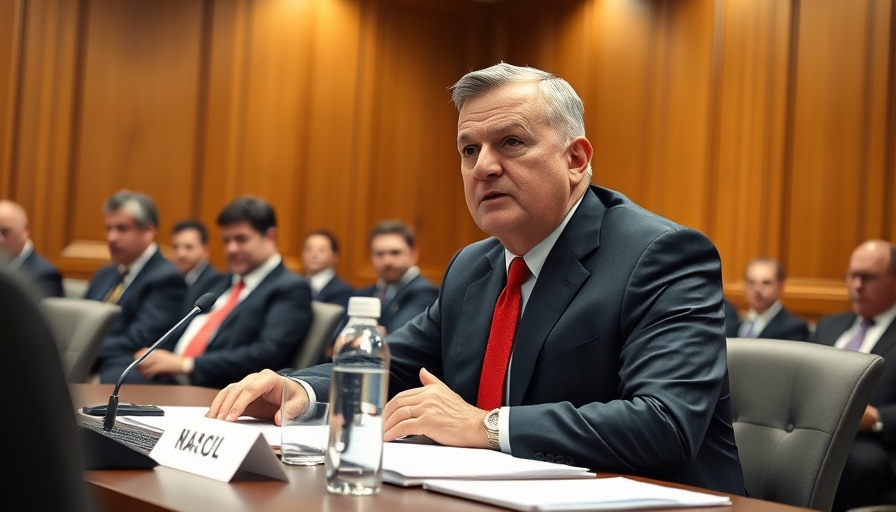
FEMA’s Crisis: Leadership Changes Amid Controversy
The ousting of FEMA leader Cam Hamilton, just a day after he publicly opposed the possible elimination of the agency, raises serious questions about the decision-making process within the Trump administration. Hamilton, who served as FEMA's acting administrator, articulated a vision for the agency grounded in federal service and public safety during his recent testimony before Congress. His quick removal suggests a troubling precedent where dissent against executive decisions may not be tolerated.
The Bizarre Timing Behind the Ouster
Hamilton’s dismissal was notably timed. He had expressed his belief that eliminating FEMA would be detrimental to American safety during a House Appropriations Homeland Security Subcommittee meeting. Following these remarks, the administration’s actions can be interpreted as a clear signal: opposing the leadership’s direction, especially in a politically charged environment, comes with consequences. The replacement of Hamilton with David Richardson, previously serving as the assistant secretary of the Countering Weapons of Mass Destruction Office, indicates a possible pivot towards a strategy that aligns more closely with the Trump administration's objectives.
Political Ramifications in Pennsylvania and Beyond
This shake-up at FEMA has stirred concern among lawmakers, particularly as hurricane season approaches in just a few weeks. Legislators such as Rosa DeLauro and Debbie Wasserman Schultz have publicly expressed their discontent regarding how this leadership change could impact readiness for natural disasters at a crucial time. Given Pennsylvania's vulnerability to extreme weather events, residents should be particularly attentive to how FEMA’s leadership transitions might affect disaster response in their state.
Understanding FEMA’s Role and Importance
The Federal Emergency Management Agency (FEMA) plays a critical role in disaster response coordination, housing, and recovery funding. Understanding the implications of a weakened agency is essential for citizens. In recent years, the agency has been instrumental in response efforts during hurricanes, wildfires, and floods—not just in Pennsylvania but all across the nation. Eliminating or significantly reducing FEMA could lead to delays in response times and inadequate support for those affected by disasters.
Future Predictions: What Lies Ahead for FEMA?
As discussions about FEMA’s future continue to emerge, it is essential for the public to understand what this means in terms of disaster preparedness. Future implications could include a greater emphasis on state autonomy in managing disaster responses, with mixed results in efficiency and effectiveness. It remains to be seen whether the Trump administration’s vision for FEMA will yield the intended outcomes, but what is clear is that the stakes are exceptionally high as policymakers move forward.
Connecting with Local Perspectives
For residents of Pennsylvania, the abrupt removal of Hamilton should be a call to action. The upcoming hurricane season, combined with existing climate challenges, necessitates a public dialogue about the need for robust emergency management. Active engagement with local representatives, emphasizing the importance of a strong FEMA presence and critiquing policies that undermine disaster response efforts, is crucial. Pennsylvanians should advocate for maintaining, or even strengthening, the federal investment in FEMA.
How to Stay Informed and Prepared
In light of the uncertainty regarding FEMA’s future, Pennsylvanians can take steps to prepare for potential emergencies. Marginalizing the importance of this agency could leave communities vulnerable. Individuals and families should educate themselves on local emergency plans, engage with local government initiatives, and consider creating personal emergency kits. Preparedness starts at the local level, and every resident has a role to play in ensuring their community is equipped for any disaster.
Your Voice Matters
The rapid leadership changes at FEMA should inspire residents to reflect on the importance of communication between their Representatives and the federal government regarding emergency management. As the future becomes clearer, let your voice be heard—advocate for a FEMA that prioritizes safety, readiness, and public welfare. Engage with your local government, participate in discussions, and hold leaders accountable for the direction of emergency management policies. The safety of our communities depends on informed and active citizens.
 Add Row
Add Row  Add
Add 




 Add Row
Add Row  Add
Add 

Write A Comment